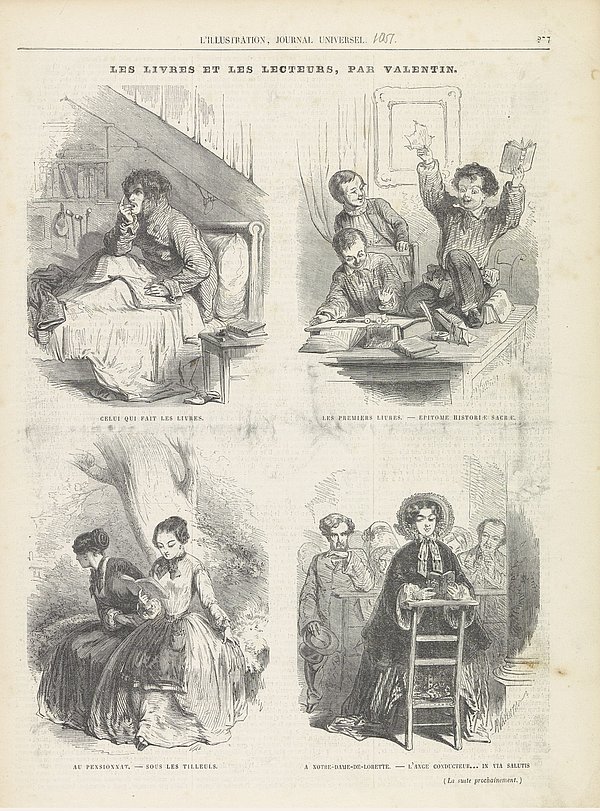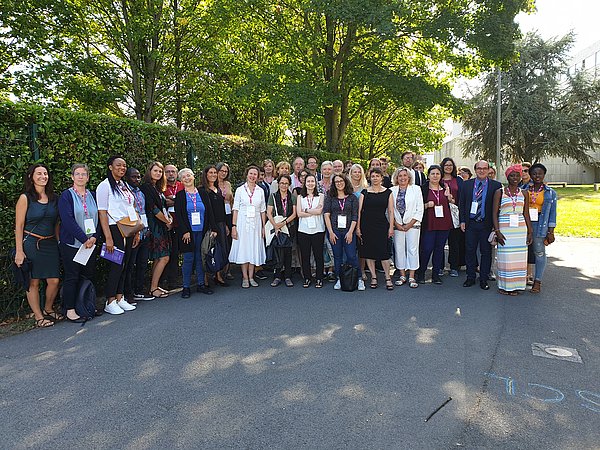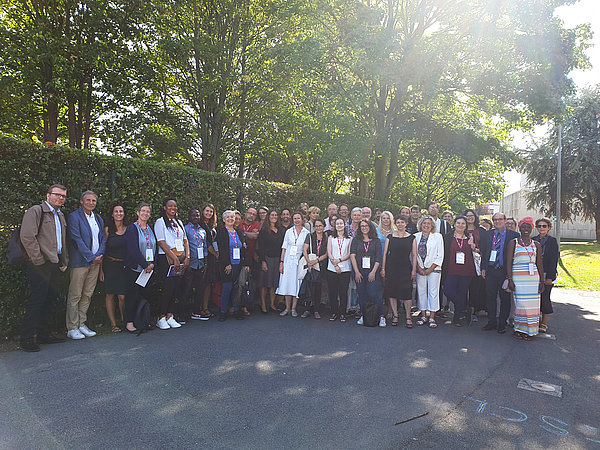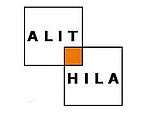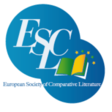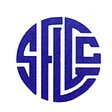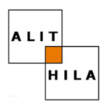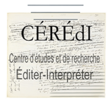8e Congrès de la Société européenne de Littérature comparée (ancien « Réseau européen d'études littéraires comparées » ), Lille 2019 (26 au 30 août)
Littérature - échanges culturels – transmission : savoirs et créations entre passé et avenir
8th Conference of the European Society of Comparatice Literature (former Network of Comparative Literature Studies), Lille 2019 (26-30th August)
Literature, cultural exchanges and transmission: knowledge and creation between past and future (Evolution of literary standards, transmission of cultures and knowledge: reception, translating, literary history...)
Le 8e Congrès de la Société européenne de Littérature comparée se tiendra du 26 au 30 août 2019, à l'Université de Lille et à la MESHS Lille Nord de France./ The 8th Congress of the European society of comparative litererature will take place from the 26-30th August 2019 at the University of Lille and at the MESHS Lille Nord de France.
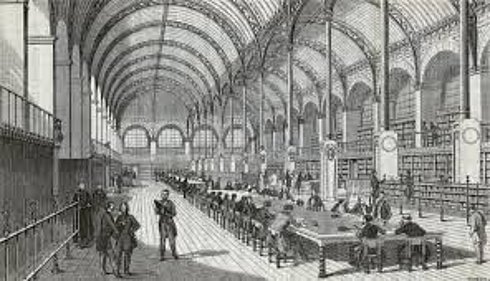
Thématique du congrès:
La circulation des idées en Europe (et dans le monde) est un phénomène ancien, le « dialogue interculturel » un vaste domaine qui offre une grande diversité d’approches de questions qui pourront être envisagées dans le cadre de ce Congrès : il s'agit, en effet, de problématiques a-temporelles, qui doivent être interrogés constamment en tenant compte des évolutions sociales, économiques, techniques et, bien sûr, culturelles.
À notre époque de transformation rapide du monde et de la rencontre des cultures (parfois, sur le mode de l'affrontement), la place qu’occupent, dans la société, la littérature, voire les sciences humaines et sociales est souvent mise en cause et doit être redéfinie : des études de réception des années 1970/80 à la mise en valeur des relations intermédiales et interculturelles, en passant par les travaux sur les transferts culturels, s’ouvre un vaste champ de réflexions théoriques, méthodologiques, esthétiques.
Le congrès de la SELC (REELC) sera l’occasion de s’interroger sur les conséquences que les transformations socio-économiques du monde contemporain (dont, entre autres, la mise en place des accords européens d’harmonisation du système universitaire) ont pour la transmission des savoirs et pour celle des œuvres culturelles, pour l’évolution des canons littéraires et pour les choix de programmes scolaires et universitaires (dont l’idée d'une « nouvelle histoire littéraire européenne » s’écrivant contre une émergence nationale des lettres), mais aussi pour la création littéraire et artistique.
Il importe de donner une perspective temporelle et spatiale à ces interrogations : pour cela, on reviendra sur l’histoire et sur l'évolution de la notion de « diffusion » et sur celles des chemins de la «dissémination », sur la réinterprétation des éléments diffusés ; on s’interrogera sur les contacts qui expliquent tels ou tels rapprochements et on mettra l’accent sur le décentrement et sur les glissements sémantiques liés aux déplacements dans l’espace et dans le temps.
Si la situation actuelle de la recherche se traduit par la réorganisation pratique de nos institutions, ces changements peuvent aussi avoir des conséquences en termes épistémologiques. Ainsi conviendra-t-il de réfléchir sur la question de savoir dans quelle mesure le statut, le mode de production / création et de diffusion du littéraire ont été modifiés dans les dernières décennies, si et comment l’insertion sociale de l’objet littéraire a changé, elle aussi. On étudiera également les conséquences de la globalisation économique pour la globalisation culturelle : l'émergence d'une « littérature monde » entraîne-t-elle une uniformisation de la création littéraire ou, au contraire, provoque-t-elle, parfois comme phénomène de réaction, l’expression et la mise en valeur de cultures locales / régionales ? Il faudra s’interroger sur ce que la globalisation signifie pour les échanges culturels, sur ce que devient, dans une telle situation, la relation à l'autre, à l’étranger. À ce propos, il conviendra aussi de mettre de tels questionnements en perspective avec des périodes plus anciennes qui s’étaient illustrées par leur ouverture au monde et par un changement des paradigmes, comme p. ex. la Renaissance (et l’émergence de la « Galaxie Gutenberg »).
Thematics:
Globalisation is not a new phenomenon. Ideas have been circulating all over Europe (and the world) since ancient times, hence intercultural dialogue is a wide field offering a great variety of approaches for the questions which may be considered during this Conference: throughout time, these questions keep recurring, and constantly require a fresh outlook, taking into account social, economic, technical and of course cultural changes.
In such times as ours, when the world is swift to change and cultures are destined to meet (sometimes, alas, to clash), the place of literature, or broadly speaking human and social sciences, within society, is often questioned, and needs redefining: from the reception studies of the 1970s and 80s to the stress laid on intermedial and intercultural relations, not forgetting the work done on cultural transfers, this question opens up a wide field of theoretic, methodological and aesthetic research.
The conference of the European Network of Comparative Literature will allow us to examine the way in which socio-economic changes in the contemporary world (including European agreements for harmonizing the university systems) affect the processes by which knowledge and cultural works are transmitted, the evolution of literary standards. These evolutions also entail new ways of defining new programs in schools and universities (such as the concept of a new European literary history, as opposed to a strictly national vision of the growth of literature). The repercussions on literary and artistic creation should also be taken into account to help us to question our assumptions and practices.
It is crucial to ground these queries in time and space: with that in mind, we shall go over the history of diffusion, the changes this concept has undergone, the ways and byways of dissemination, the reinterpretation of the elements thus disseminated; we shall ask ourselves which connections best explain this or that propinquity, and how movements in space and in time are able to displace the centre and make semantics undergo sometimes radical shifts.
If research is affected by the ongoing practical reorganization of our institutions, such changes may also have epistemological consequences. In the last decades, we may ask ourselves how the status of literature, the processes by which it is created, produced, disseminated, have been modified, whether the way in which literature takes its place within society has changed, and if so, in what way. We will also examine the effect of economic globalization over cultural globalization: does the birth of a “world literature” mean that literary creation is becoming uniform, or on the contrary does it arouse an antagonistic tendency towards expressing and highlighting local and regional cultures? We must ask ourselves what globalization means for cultural exchanges, what becomes of the relation to the other, to the foreigner, in such a juncture. In this light, it would be useful to gain perspective by relating such questions to more ancient periods which were noted for their openness to the world, and their willingness to accept new paradigms, such as the Renaissance (and the birth of the “Gutemberg galaxy”).

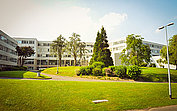
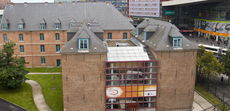
Pour s'inscrire/Inscription:
commandes-recherche.univ-lille3.fr/inscription-evenement/Comparatismett2019/
programme-congres-final-complete-21-08-2108 / Final version Congress program
ABSTRACTS CONGRESS 25 août 2019.1
sous réserves de modification/subject to possible changes
Informations:
Lille est accessible par avion (aéroport de Lesquin, aéroport de Roissy + train, aeroport de Bruxelles+bus), par train (gare Lille-Flandres et Lille-Europe), par la route (A1, A 22, A 25, A 27, E 42). Le congrès se tiendra sur deux sites (MESHS Nord de France et Université de Lille). Il est possible de loger à Lille ou à Villeneuve d'Ascq, à proximité du stade Pierre Mauroy ou de la cité scientifique. La ligne 1 du métro relie les deux sites, ainsi que le stade Pierre Mauroy (arrêt Triolo) et la cité scientifique (arrêt Professeur Gabillard ou 4 Cantons). Temps moyen Gare Lille Flandres-Station Pont de Bois 20 minutes.
En raison de la Braderie (31 août-1 septembre), il vaut mieux réserver le week-end du 24 août si vous souhaitez faire du tourisme à Lille. Les hôtels seront très demandés à partir du vendredi 30.
Lille may be reached by plane (the local airport is Lesquin ; arrivals in Roissy may board a T.G.V. to Lille, arrivals in Brussels may board a bus) ; by train (in either Lille Flandres or Lille Europe train stations) and by car (A 1, A 22, A 25, A 27, E 42). Reservations may be made in Lille or in the suburb of Villeneuve d’Ascq, close to the Pierre Mauroy stadium or close to the scientific campus. Line 1 of the metro will take you from the centre of Lille to Villeneuve d’Ascq in about 20 mn (stop at Pont de Bois), to the Pierre Mauroy stadium a little further (stop at Triolo) or to the scientific campus (stop at Professeur Gabillard or Quatre Cantons).
On Saturday, 31 August 2019 and Sunday, 1st September, the city centre will be taken over by the Braderie, a flea-market which attracts swarms of visitors; hotels will be in great demand and their prices will rise on the evening of Friday 30. If you wish to visit Lille in a quieter way, we recommend that you make plans for the 24 and 25 August.
